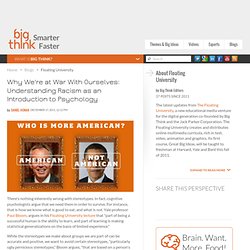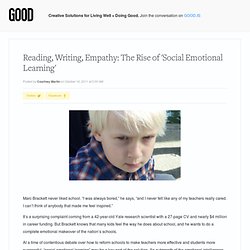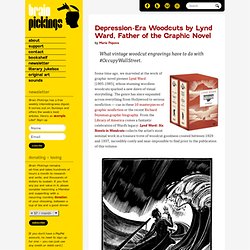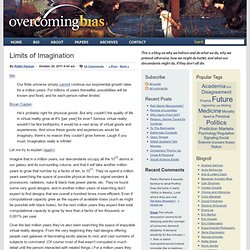

In Reading Facial Emotion, Context Is Everything. News In a close-up headshot, Serena Williams’ eyes are pressed tensely closed; her mouth is wide open, teeth bared.

Her face looks enraged. Now zoom out: The tennis star is on the court, racket in hand, fist clenched in victory. She’s not angry. She’s ecstatic, having just beaten her sister Venus at the 2008 U.S. Why We're at War With Ourselves: Understanding Racism as an Introduction to Psychology. There's nothing inherently wrong with stereotypes.

In fact, cognitive psychologists argue that we need them in order to survive. For instance, that is how we know what is good to eat, and what is not. The Evolution Of Cooperation Edge Master Class 2011. I have a second story induced by Steve's brilliant talk and by people who don't do violence, but imagine violence.

Therapists are using virtual environments to help people work through phobias. The Psychology of Occupy Wall Street. Some people will see anything they want to see in any particular movement or demonstration.

Movements like Occupy Wall Street are like a Rorschach Inkblot Test — although it’s just ink on a piece of paper, you can see the future and the past in every blot. Psychologist and psychoanalyst Todd Essig sees what he wants to see in the movement. When contrasting it with the Tea Party, he idealizes the motivations and focus of the Occupy Wall Street demonstrators, as though they were all joined together in a common cause (other than the cause to agitate for change, something President Obama actually started more than 4 years ago).
What I have a hard time wrapping my head around is to understand how people who have such a deep understanding of psychology and insight can’t see how they turn such demonstrations into their own personal Rorschach test. For the record, I’m not a proponent of either the Tea Part of Occupy Wall Street. Xenophobia is nothing new, and the Tea Party hasn’t invented it. Reading, Writing, Empathy: The Rise of 'Social Emotional Learning' - Education. Marc Brackett never liked school.

“I was always bored,” he says, “and I never felt like any of my teachers really cared. I can’t think of anybody that made me feel inspired.” It’s a surprising complaint coming from a 42-year-old Yale research scientist with a 27-page CV and nearly $4 million in career funding. But Brackett knows that many kids feel the way he does about school, and he wants to do a complete emotional makeover of the nation’s schools. At a time of contentious debate over how to reform schools to make teachers more effective and students more successful, “social emotional learning” may be a key part of the solution.
Brackett quickly learned that developing empathy in kids requires working on their teachers first. But the curriculum doesn’t just exist as a separate subject— teachers are trained to integrate lessons in emotion into other subjects. Now in use in hundreds of schools around the country, RULER has been measurably successful. Why the change? Warren Fellow Examines Terrorist Psychology. Depression-Era Woodcuts by Lynd Ward, Father of the Graphic Novel. By Maria Popova What vintage woodcut engravings have to do with #OccupyWallStreet.

Some time ago, we marveled at the work of graphic novel pioneer Lynd Ward (1905-1985), whose stunning wordless woodcuts sparked a new dawn of visual storytelling. The genre has since expanded across everything from Hollywood to serious nonfiction — cue in these 10 masterpieces of graphic nonfiction or the recent Richard Feynman graphic biography. Limits of Imagination. Me: Our finite universe simply cannot continue our exponential growth rates for a million years.

For trillions of years thereafter, possibilities will be known and fixed, and for each person rather limited. Bryan Caplan: He’s probably right for physical goods. A new discipline emerges: The psychology of science. You've heard of the history of science, the philosophy of science, maybe even the sociology of science.

But how about the psychology of science? In a new article in Current Directions in Psychological Science, a journal published by the Association for Psychological Science, San Jose State University psychologist Gregory J. Feist argues that a field has been quietly taking shape over the past decade, and it holds great promise for both psychology and science. "Science is a cognitive act by definition: It involves personality, creativity, developmental processes," says Feist -- everything about individual psychology.
5 Gifts of Being Highly Sensitive. Today I have the pleasure of interviewing Douglas Eby, M.A.

/Psychology, who is a writer and researcher on the psychology of creative expression, high ability and personal growth. He is creator of the Talent Development Resources series of sites (including HighlySensitive.org) at I know many of you are “highly sensitive” and enjoy articles on that topic, so I am excited to pique his highly-sensitive brain today! Question: If you had to name the top five gifts of being highly sensitive, what would they be? Douglas: 1. Reliability of Eyewitness Testimony: What We Learned From Troy Davis. The Complicated Psychology of Revenge. A few years ago a group of Swiss researchers scanned the brains of people who had been wronged during an economic exchange game. These people had trusted their partners to split a pot of money with them, only to find that the partners had chosen to keep the loot for themselves. The researchers then gave the people a chance to punish their greedy partners, and for a full minute, as the victims contemplated revenge, the activity in their brains was recorded.
The decision caused a rush of neural activity in the caudate nucleus, an area of the brain known to process rewards (in previous work, the caudate has delighted in cocaine and nicotine use). The findings, published in a 2004 issue of , gave physiological confirmation to what the scorned have been saying for years: Revenge is sweet.